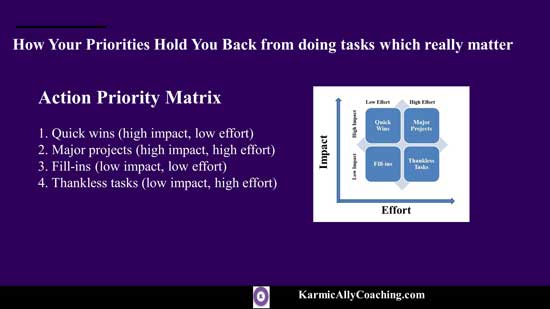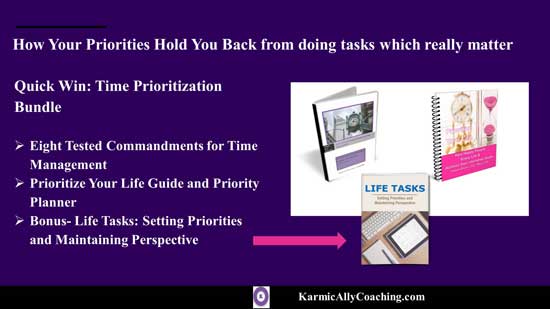Resources Mentioned in the video
Quick Win Resource: Time Management Bundle
5 Step Method to win your Time Management Challenge Course
Prefer to read? Here’s the full Transcript

What does the best version of you look like? Seriously, think about that for a minute. Your current reality might be good, but you know it can still improve. You want to do something to change in some way so that your experiences change. You realize your relationships, financial picture, or health can improve.
So, you’re taking action. For people that are driven to create significant and positive change, effort or desire is never in low supply. You’ve probably tried to do things in the past to create change.
Maybe you succeeded at some level. Many of us who attempt to create better versions of ourselves will find early success, only to eventually return to the undesired reality where we started.
There’s a reason for this.
It happens when our priorities are out of place.
You know what you want. You consciously desire to become better. So, you gather the knowledge. You take action and are determined to create the desired result. That can’t happen if your priorities aren’t in line with what you tell yourself you want to accomplish.
I have seen it happen with different clients who hit a roadblock and while they talk about productivity at work and loss of work life balance, they often overlook where their tasks, actions and relationships lie on their priority list.
Hi, I’m Vatsala Shukla and today we’re going to be looking at how our priorities are holding us back from doing tasks which really matter.
For sure this is a time management issue but what happens when using the Blanchard or Covey Quadrant doesn’t work?

I remember a client of mine doing the Covey Quadrant exercise and then reporting back that everything was falling in the Urgent and Important part of the quadrant.
So, the next question was, what’s more important in terms of priorities?
Now here’s the thing, we may make the most of our time and possibilities by carefully selecting activities. However, if we make poor choices, we may become bogged down in time-consuming, low-yield tasks that prevent progress. An “Action Priority Matrix” can help in this situation which I’m going to share with you.
But first, let us look a little more at the priorities.
Now when you change your priorities you can change your experience.
And if you want a better, more fulfilling, and healthier relationship, what are you doing to make that happen? Do you have a detailed game plan? Or do you work on strengthening your relationship whenever you think about it?
We are talking about are priority. You may desire a wonderful relationship more than just anything else. That will not happen if your actions reveal that you prioritize other activities ahead of strengthening your relationship.
Now that is just one area my client was having problems. But another one which I’m going to share with you is that perhaps it is the work side. You might be working too much. And you have an idea that the harder you work, the better are your chances of getting promoted. Or the more money you can make, the better reality you can give your family.
So, you pour yourself into the work. You’re working long hours, weekends and all. But, when it comes time to getting promoted, the promotion is given to someone else. Somebody who has more poise and charm and you find that you’ve been had.
Now that isn’t really going to help you much, is it? But there is a simple tool that you can use to overcome this challenge. And this tool will help you to figure out your priorities and what actions will actually move the needle for you. It is a tool that works both for your professional and personal life. I mentioned it a little while back.
It’s called the Action Priority Matrix.
The Action Priority Matrix is a straightforward tool for determining which actions to prioritize and which to delegate or remove. And it’s going to permit you to get most of the chances you have.
Now, if you know how to chart your To Do List activities on a Covey Quadrant, then this matrix will take it a step further to show you what tasks need prioritization.
When we use the matrix to choose activities wisely, we spend more time on the high-value tasks that keep us moving forward. And you can apply it quickly and intuitively to new jobs and projects. And that is what we actually did with my client, and she finally started to get hold of her time and productivity and her relationships. So, it’s not a tool to just laugh at.
In fact, it’s so simple. It can be a basic chart that compares urgency and importance or a complicated grid that considers various factors.
Businesses use Priority matrices for various purposes, including work delegation, ranking possible projects by importance, and ensuring project visibility by documenting the decision process. So, it’s a multi-purpose tool.

And here’s how you’re going to create it. You create this matrix using two components.
First, you draw a graph that measures effort along the x-axis over here and impact along the y-axis over here. Next, you add boxes to the graph, two stacked on top of the others.
And with the finished diagram, you can plot all of your initiatives to see if they are high impact and low effort, high impact and high effort, low impact and low effort, or low impact and high effort.
And I’ve given it on the screen. You can note it down or take a screenshot of it.
So here is the breakdown, the 6 steps and they are easy.

The first step is you make a list of the major tasks that you want or need to perform. And then you assess the impact (from 0 to 10 for the most significant effect) and the effort required (from, say, 0 for no real action to 10 for a substantial step). And then using your scores, you plot the actions on the Action Priority Matrix.
You set suitable priorities and delegate or eliminate the low-impact tasks. And then, make rapid wins your top priority. Tasks in the top left square require less effort but have a more significant effect. And once that is done, the sixth step is to use the time left over to work on your essential tasks.
Now this is quite simple. A bit of effort is required in the beginning but depending on how dedicated you are you’re learning curve can be quite fast and you’ll start seeing results. But sometimes other questions do arise.
And I’m going to look at them now.
What about if you’re using this for a team?
In this case you’re going to consult your team members and coworkers and find out what would assist them in completing each task. And then assign tasks based on their role and follow up to maintain momentum. Simply delegating a task doesn’t mean that you hand it over and run away.
Remember to also add any practical task that might be required. And this is a point I want to make because what may seem like a thankless task when you are plotting it on the matrix can become important later as you complete your high priority tasks.
This could include you know filling up milestone sheets and other documentation required in order to be able to go back and check later on if something goes wrong.
And another one is what should you do first – the Quick Wins or Major Projects?
Now this question comes up often and is worth considering based on your particular situation because there is no right or wrong answer. If completing a major project will take up a lot of your time but has a very high impact on the rest of your work, then you might decide to leave the quick wins and focus your attention on the major project.
On the other hand, if you can get a number of quick wins out of your task list, then that combined set of wins could have as great an impact as a major project. It would also help you build your momentum to get more work done. It all comes down to your particular situation and task at hand.
Additional Resources:
Now, I have some resources that I can share with you because ultimately, this is a time management issue combined with productivity and peace of mind.
So here is a quick win. That’s my Time Prioritization Bundle and I suggest that you download and apply the guidance in this small but effective Time Management Bundle where you’ll learn the 8 commandments of Time Management and also how to prioritize your life.
And you’ll also be getting Priority Planner with it. For a limited time, I’m also gifting you Karmic Ally Coaching’s Setting Priorities and Maintaining Perspective guide. It’s not available for sale elsewhere on my website. Details on how to get your bonus will be provided further down on this page. (Scroll up for details on getting the bonus)
And if you’re looking for a long-term project, then I’ll also be sharing with you how you can acquire my time management course for busy professionals but for now, let us focus on a quick win and get you a jumpstart.
So, my final words on the topic for today are that you should look at what you do habitually.
You might not consciously prioritize activities and habits that deliver a negative experience. It may be happening unconsciously. And if things you do regularly aren’t creating the best version of yourself, then change your priorities.
When you prioritize making changes that relate to your core values and beliefs, you’ll see more success in creating that reality. And the same holds for work and tasks that you have to do. So it’s not just life, it’s also work and this is how you’re going to get that elusive work life balance too.
This is Vatsala Shukla for Karmic Ally Coaching signing off. To your best version of yourself and utilization of your time. Bye for now.





 I adhere to the Certified Coaches Alliance Code of Ethics and Standards. A copy is available on request.
I adhere to the Certified Coaches Alliance Code of Ethics and Standards. A copy is available on request.
 Let's Talk through the Connect Form:
Let's Talk through the Connect Form: